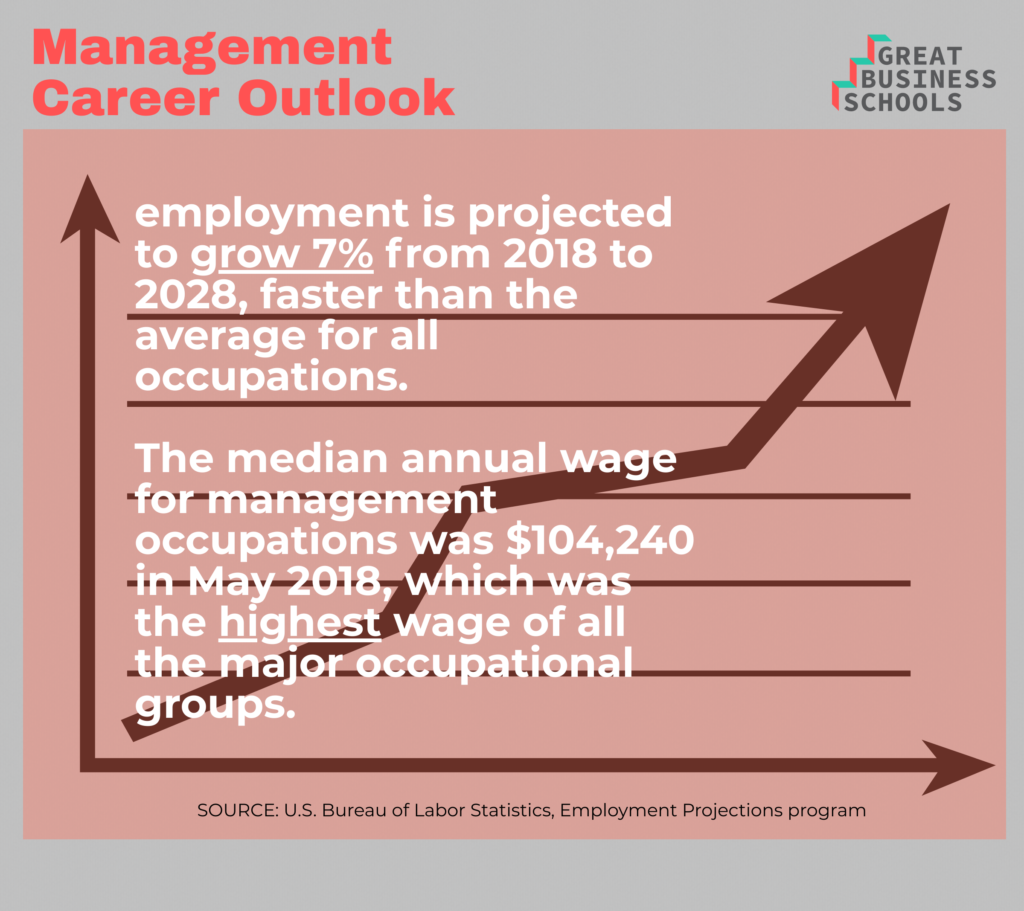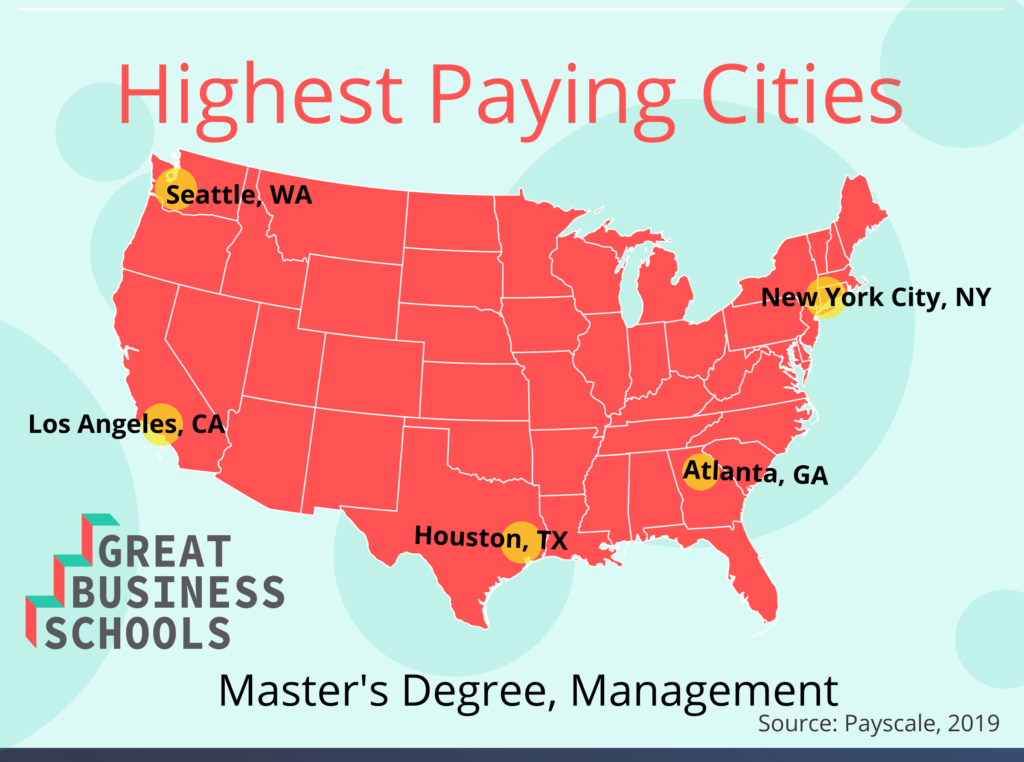A Masters in Management degree is a post-graduate degree designed to teach students the basics and fundamentals of management as it applies to different disciplines. This degree, also known as MiM or Masters of Science in Management (MSM), aims to help new graduates who want to take on management positions in fields where the traditional MBA is not as valuable – areas like education, public administration, and much more. It is also useful to recent graduates who do not have business experience.
While the MiM is not exactly new, the popularity of the degree has risen in recent years as many major universities started offering MiM programs. The success of such programs in Europe has led to MiM and MS in Management Degrees showing up at universities all over the world.
With a MiM degree, students can move on to take on management roles in various industries including marketing, sales, and any other professional sector they choose. This represents a clear difference from pursuing an MBA, which is comparable but not the same thing. In fact, the two degrees are at times so comparable that many people wonder about the major differences between an MBA vs MSM.

MS vs MBA Which is Better
To gain a better understanding of the MiM and to answer the questions of is Masters in Management worth it, a comparison to a traditional MBA program can help. Here are some of the differences when it comes to an MBA vs MSM (MIM).
Before getting into it, applicants should understand that the question of MS vs MBA which is better has no direct answer as applicants will have to choose the degree types that aligns most with their personal and career goals.
MBA Rankings:
- Best On-Campus MBA Degree Programs
- Best Online MBA Degree Programs
- Fastest Online MBA Programs
- Most Affordable Online MBA Programs
An MiM degree typically caters to recent graduates rather than experienced professionals. An MiM program works best for those with little to no business experience who want to enter the business field quickly.
An MBA typically caters to business professionals, as in those already working in the industry and pursuing a more prestigious degree to help them achieve advanced placement goals. Most MBA programs even expect a certain amount of experience from applicants, whereas an MiM degree program wants applicants who lack a significant amount of experience.
An applicant pursuing an MiM is trying to start their career, whereas an MBA student seeks to advance the career they are already in. These differences also create something of an age gap, as MiM students tend to have a younger average age than MBA students.
MiM degree curriculums can vary, but they generally teach a lot of introductory and foundational management techniques and theory-based business teachings. On the other hand, an MBA student will likely take on practical studies and specializations while learning to which aim to apply their business knowledge to creating solutions.
In this way, potential students can think of the MiM as a quicker means to get into the door of a good company to start their careers and gain more experience. They can think of an MBA as a way to advance their careers and move on to larger roles or expand their value.
Another motivation for choosing one degree type over another comes from the fact that MiM degree programs, on average, cost less than an MBA program. Applicants should know that tuition costs can vary greatly depending on numerous factors, but an MiM degree will, on the whole, come out as the more economical choice in many cases.
MiM programs can also take less time to complete. Depending on the type of program, and the details of the specific MS in Management program an applicant chooses, earning their MiM degree can take as little as 10 months. By contrast, an MBA program, outside of special accelerated courses and other non-traditional MBA types, can take up to two years to complete.
Once again, this comparison is not set in stone. Some MiM degree programs can take up to two years as well while some MBA programs of certain types can last a considerably shorter amount of time. This is all important for applicants to know because when they are choosing an MiM or an MBA degree program, they must make sure they are choosing one with a time frame they are comfortable with.
Some MiM programs also offer a segue into an MBA program. How this works will depend on the school and program. In some cases, the program can simply start as an MiM but offer the option to continue on as an MBA.
In some other cases, earning an MiM can allow someone to skip some courses or transfer the credits they earned with their MiM to the MBA program. This can work well in cases where the MBA program shares some of the same introductory or foundational classes as the MiM program, which is frequently.
What Schools or Program Should I Choose for a Master’s in Management? What About Accreditation?
MiM programs are offered by business schools and colleges with business tracks. Many of the MBA schools also offer MiM programs as well. For these reasons, applicants can find schools or programs that fit their needs. However, applicants must also pay close attention to the accreditation status of any program or school they are considering.
The importance of accreditation cannot be understated. Accreditation means that a school or program meets the minimum standards set by education experts and groups. Those accrediting groups are not all the same, and there are different types of accreditation to look out for.
Applicants should verify if the program or school they are looking for has accreditation from a regional group, a specialized group, or both. Schools and programs must voluntarily submit their programs or campus to an accrediting body and maintain that status. It is possible for a school or program to have more than one type of accreditation. In general, the more viable accreditations a school or program has, the better.

What Is Regional Accreditation?
Regional or institutional accreditation means the entire institution and all its operations were evaluated and meet the standards of one of the regional accrediting bodies. Six regional accrediting bodies have the recognition of the US Dept. of Education, and they oversee accreditation of universities in their respective regions.
In most cases, these accrediting bodies will evaluate a university as a whole. This means the school itself can meet the educational requirements and standards, but it does not always mean that individual programs offered by the school meet the standards set by the specific industry that program represents. That is where specialized accreditation comes into play.
What Is Specialized Accreditation?
Specialized or programmatic accreditation comes from accrediting groups that form for specific industries or disciplines. Accreditation from these groups also goes by the name of national accreditation because they are not limited to a specific region. Also, some specialized accrediting groups do have the recognition of the Dept. of Education as well, but that is not always the case, nor is it always necessary.
Several national accrediting groups for business programs exist. There are some major, widely known groups as well as some lesser-known or niche groups. Generally, these three accrediting bodies are always worthwhile when it comes to business programs:
- AACSB or Association to Advance Collegiate Schools of Business
- ACBSP or Accreditation Council for Business Schools and Programs
- IACBE or International Assembly for Collegiate Business Education
For MiM and MSM programs specifically, a few other accrediting groups also have some recognition. These include the aforementioned AACSB accreditation as well as two others:
- AMBA or Association of MBAs
- EQUIS or EFMD or European Foundation for Management Development
These last two are more global accrediting bodies that work more with programs in Europe. However, a school or program can have triple accreditation which means it has an accredited status from AACSB, AMBA, and EQUIS collectively. If an applicant should come across a program with triple accreditation, they should give that program serious consideration. This is especially true if the applicant wants to dive into international business.
Nevertheless, AACSB accreditation alone is excellent for a MiM program. Business accreditation with IACBE or ACBSP standards will work as well. In the US specifically, many people wonder is ACBSP accreditation good or bad, or they ask is ACBSP respected. Know that both IACBE accreditation and accreditation with ACBSP standards are both good.
In this case, it is just that AACSB accreditation has the widest reach, reputation, and recognizability. So, most people assume it is the only type of accredited status to look for. But, business accreditation in the form of ACBSP or IACBE accreditation will result in an MiM degree with the same amount of respect as one that comes from a school with AACSB accreditation standards.
Also, applicants should always look for schools or programs that contain multiple accredited statuses whenever possible. AACSB accreditation standards can account for a good business education, but if a school can meet and exceed the standards of multiple accrediting bodies, then that is a school worth putting real thought into.

What Are the Different Types of Management Master’s Degrees?
One thing about Masters in Management studies is that they can vary widely from school to school or program to program. This means there are several types of Masters Business Management degrees. The Masters in Management top universities even offer flexible, custom curriculums and other types of management degrees depending on what discipline an applicant wants to focus on.
This is a good thing, since Masters in Management studies can go in a lot of different directions. For example, a student can learn the fundamentals but still choose finance courses as their specialization.
The Masters in Management Studies from such a program will teach a student management basics but prepare them for entering the finance discipline of the business industry. The student will have the same Masters Business Management degree but that specialization will help them further their goals.
Masters in Management programs also have an international aspect to them. This stems from the fact that the MiM types of business management degrees grew popular overseas first. A Masters in Management in USA, especially one with triple accreditation, can help someone move their studies overseas or find placement with international businesses.
When graduates earn their Masters in Management in USA, they will typically receive them from Masters in Management programs that follow some of the same principles as international versions of the program. In fact, when an MiM program has AMBA accreditation, that program awards the equivalent of an MBM degree, or Masters of Business and Management.
The MBM degree is the name of the degree mainly in the UK. Still, it is the equivalent of the same degree awarded through any Masters in Management programs.
The Masters in Management top universities may also offer different types of business management degrees based on whether a student will want to stay to continue their education, change their business discipline later, or immediately move on to finding a job placement.
For business students that are looking for the types of management degrees that usually come with experience, it is sometimes easier and more economical to take on the business management degree cost first. After that, they can have an easier time moving on to something like an MBA.
Are Masters in Management Programs Available Online?
As with most forms of higher education these days, it is absolutely possible to earn an online Master’s in Management. An online Management degree will come with all the same considerations as an offline degree. Applicants will have to choose the best online Master’s in Management program that meets their requirements and goals.
An online Master’s in Management program can exist purely online or partially. Many universities may offer an online management degree but can require a student to travel for an internship or for a particular course. So, when looking for online degree in Management, applicants need to make sure they choose the one that can accommodate their needs best.
Also, an online degree in management can still have accreditation from the right accrediting groups. This is another thing applicants need to pay attention to. The best online Master’s in Management programs will offer the same quality education as long as the applicant chooses wisely.
What does an online Master’s in Business Management offer? The online Master’s in Business Management title should serve as a reminder that an MiM is foremost a management degree, with all that entails. This is the same as an online Master’s in Management and Leadership degree.
Applicants who come across different names, such as the aforementioned online Master’s in Management and Leadership, should make sure the program they are looking is the equivalent of an MiM. Master’s in Management online programs can sit side by side with other types of online management degree types.
Also, note that Master’s in Management online programs can sometimes come disguised as certificate programs behind claims of getting a Business Management degree online free. While there are some free courses, out there, these are not going to earn applicants a Business Management degree online free but may help introduce them to the types of things they will study and learn through an accredited program.
What Type of Careers in Management Are Available for Masters in Management Graduates?
Careers and Masters in Management Jobs will typically consist of entry level management positions in the applicant’s chosen specialty. Since the MiM degree serves as a way for inexperienced workers to gain the education they need to enter the business industry quickly, the career choices will typically start at entry level positions.
Some MiM degree programs include internships, which can help an applicant gain some experience which will look good to potential employers. In addition, applicants should always keep in mind they have Masters level business degree, which means they can demand commensurate salary, even at the entry level. In addition, that Masters degree also gives applicants a lot more choice when it comes to choosing a career path.
For example, just as the name implies, Masters in Management jobs can consist of virtually any management position, even if it is not strictly in a particular business sector. The MiM also prepares applicants to take on leadership roles. So, any occupation that requires team leaders are fair game. Applicants can also apply for supervisor positions as well.
Some more specific Master of Science in Management Jobs can include:
- Managers (Distribution, Branch, Customer Service, Admin Services, Food, Hotel, Production, etc.)
- Administrators (Benefits, Contracts, HR, etc.)
- Analyst (Budget, Financial, Reports, etc.)
- Specialist (Training, Inventory, Retail, etc.)
As is obvious, the list can go on and on. The industries that tend to hire MiM graduates most include banking, manufacturing, consulting, finance, technology, education, and government. The Master of Science in Management jobs vary widely because the MiM degree itself has a high level of flexibility just like other business degrees.

What Kind of Salary Comes with a Masters in Management?
Masters in Management salary can vary based on the occupation, industry, location, and various other factors pertaining to the applicant and the job. The University of Kansas created a report showing the offers reported by graduates of its Bachelor of Science Business Management and Leadership program.
The average reported Masters in Business Management salary reported was $53.7k. The range of Masters in Business Management salary went from $31.2k to $98k. The report also shows a stead growth in average business management starting salary for its graduates.
For example, the report shows the average reported business management starting salary offers in 2014 were $40.9k. This means Masters in Management salary continues to grow, especially as the degree gains more popularity and graduates become more sought after.
A Business Management salary with Masters is not comparable when considering a MiM vs MBA salary. Applicants who wonder about MiM vs MBA salary should know that MBA holders tend to earn far more by way of salary. This is understandable as an MBA is a post graduate and post experience degree.
Those with an MBA tend to have far more experience and knowledge in their chosen field. Masters vs MBA salary is not something to consider for most MiM graduates. These graduates have not worked in the field in any large capacity to make up the difference that exists between a Masters vs MBA salary.
This will all come with experience. As it stands, a masters in management salary is not bad, and will only get better.
Are There Professional Organizations for Masters in Maintenance Graduates?
For MiM graduates, there are numerous professional organizations out there to consider. Since the MiM is a business degree, this opens up all the business-related organizations.
The Masters in Management degree is also a management degree, and management also has countless dedicated professional associations. Beyond that comes the specialties. Practically every business-related specialty has a plethora of professional organizations.
This means MiM graduate are spoiled for choice when comes to these organizations. Not to mention the organizations that may exist at the local, county, and state levels. In fact, many colleges and universities have professional organizations so students can join one even before they graduate.
Why Graduates Should Join One or Several Professional Organizations
The benefits of joining a professional organization include:
- Continuing education and professional development
- Increased job and career opportunities
- Vastly increased networking opportunities
The networking opportunities are arguably the most important aspect of joining professional associations. These organizations tend to have leaders and innovators in the field. These are the people who know what is coming, know what is changing, and know what is happening. Graduates can find people in their field, make friends, form partnerships, and do a lot more than they can on their own.
In some cases, especially in some local jurisdictions, a graduate may have to join a certain association to even work in some industries. Some other benefits can include things like access to exclusive resources, such as databases, job searches, and other things that only the group has access to. Many professional organizations also offer conferences, seminars, and heavily discounted business tools.
Applicants should join as many organizations as they can comfortably afford or dedicate some time to. In addition, membership in professional organizations can also help fill in a resume, especially for new graduates who do not have a lot of experience.
Carrie Morris
Author
Warren Dahl
Editor-in-Chief

